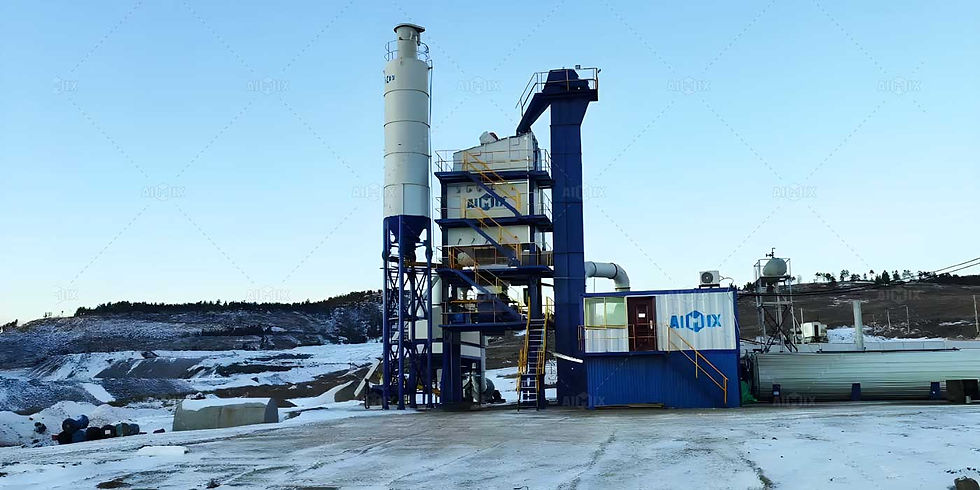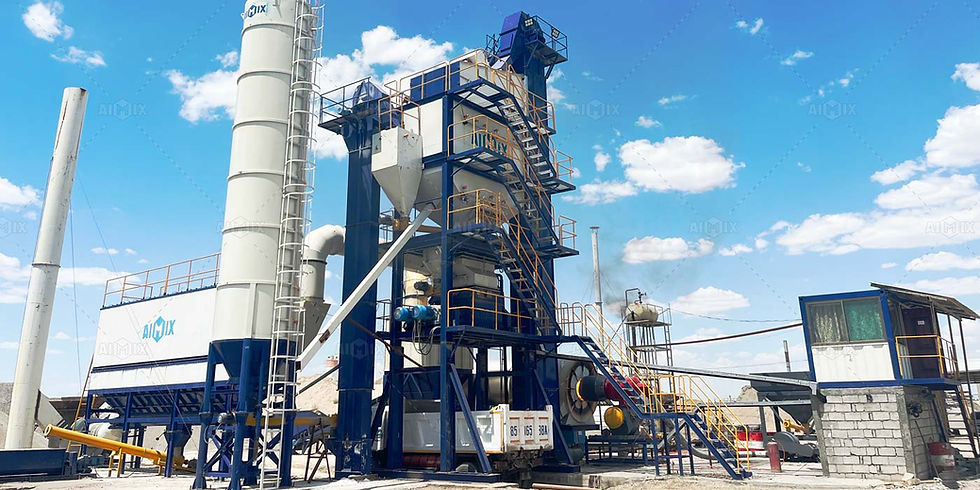What Factors Influence the Choice of Capacity for an Asphalt Mixing Plant?
- aimixglobal5
- Sep 4, 2024
- 4 min read
Selecting the right capacity for an asphalt mixing plant is crucial for the success of any road or bridge construction project. The capacity of an asphalt mixer plant directly impacts project timelines, costs, and overall efficiency. In the engineering and construction industry, making an informed decision on the capacity of an asphalt plant can determine the success or failure of a project. This article will explore the key factors influencing the choice of capacity for an asphalt mixing plant, offering insights to help you make the best decision for your needs to purchase the equipment.

1. Project Scale and Volume Requirements
The scale of the project is the first and most obvious factor that influences the choice of capacity for an asphalt manufacturing plant. For large-scale projects, such as highway construction or extensive urban infrastructure, a high-capacity asphalt batch plant is essential. These projects often require continuous production of asphalt to meet tight deadlines. In contrast, smaller projects like residential roads or parking lots may only need a low to medium-capacity asphalt plant. It’s crucial to assess the volume of asphalt required and match it with the appropriate plant capacity to avoid delays and inefficiencies.
2. Expected Traffic Load and Road Lifespan
Another important consideration is the expected traffic load on the road and its intended lifespan. High-traffic areas, such as highways or commercial zones, require asphalt with specific properties to withstand heavy use. This might necessitate a higher production capacity to ensure consistent quality and availability. The choice of an asphalt plant with the right capacity ensures that the produced asphalt meets the required standards, which is crucial for the durability and safety of the road. Engineers must consider these factors to ensure that the selected plant can produce asphalt that meets the demands of the project.
3. Plant Location and Transport Logistics
The location of the asphalt mixing plant relative to the construction site plays a significant role in choosing the appropriate capacity. If the plant is located far from the site, a higher-capacity plant may be necessary to reduce transportation costs and ensure timely delivery of the asphalt. On the other hand, a plant situated near the construction site might allow for a smaller capacity, as the shorter transport distance reduces the need for bulk production. Additionally, transport logistics, including the availability of transportation vehicles and infrastructure, must be factored into the decision-making process.

4. Frequency of Asphalt Mix Changes
In projects requiring frequent changes in asphalt mix formulations, the flexibility of the asphalt mixer plant becomes a key consideration. High-capacity plants that can quickly switch between different mixes without compromising efficiency are ideal in such scenarios. The ability to adjust production capacity based on the specific mix requirements helps maintain the project’s progress without interruptions. Therefore, understanding the frequency of mix changes and selecting a plant that can handle these demands is essential for maintaining smooth operations.
5. Budget Constraints and Cost Efficiency
Budget constraints often dictate the choice of capacity for an asphalt manufacturing plant. Larger plants with higher capacities typically involve greater initial investment and operational costs. However, they may offer cost savings in the long run by reducing production times and improving efficiency. It is essential to balance the upfront costs with the long-term benefits when selecting the capacity of an asphalt plant. For smaller projects or companies with limited budgets, a medium-capacity plant might be the most cost-effective option, offering a balance between production needs and budget limitations.
6. Environmental Considerations and Regulations
Environmental regulations and considerations also impact the choice of capacity for an asphalt plant. High-capacity plants may produce more emissions, which could be a concern in areas with strict environmental regulations. It's important to choose a plant that complies with local environmental standards while still meeting production needs. Modern asphalt plants, including those from AIMIX, often feature advanced technology to minimize emissions and environmental impact, allowing for high-capacity production without compromising environmental integrity.

7. Availability of Raw Materials
The availability of raw materials such as bitumen, aggregate, and filler plays a critical role in determining the appropriate capacity for an asphalt batch plant. A steady supply of these materials is necessary to maintain continuous production. If the supply chain is unreliable, opting for a lower-capacity plant might be wiser to avoid production stoppages. Conversely, a stable and abundant supply of raw materials can support the operation of a high-capacity plant, ensuring uninterrupted production and consistent quality of asphalt.
8. Future Expansion Plans
When choosing the capacity of an asphalt mixer plant, it’s essential to consider future expansion plans. If your business plans to take on larger projects in the future or expand its operations, investing in a plant with a higher capacity could be a strategic decision. This approach ensures that the plant can handle increased demand without requiring a costly upgrade or replacement in the near future. Planning for the future not only saves costs but also positions your company for growth and success.
Conclusion: Trust AIMIX for Your Asphalt Mixing Plant Needs
Choosing the right capacity for an asphalt mixing plant is a complex decision that requires careful consideration of multiple factors. From project scale and traffic load to budget constraints and environmental regulations, each factor plays a crucial role in determining the optimal capacity for your needs. At AIMIX, we understand the unique challenges faced by the engineering and construction industries. Our range of asphalt mixing plants, from low to high capacity, is designed to meet the specific needs of every project. With AIMIX, you can trust that you’re getting a plant that not only meets your current demands but also supports your future growth. Contact us today to learn more about how our asphalt plants can help you achieve your project goals. Get to know what is the capacity of asphalt plant.



Comments